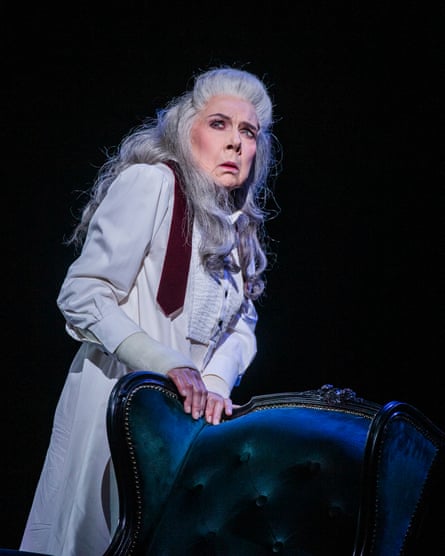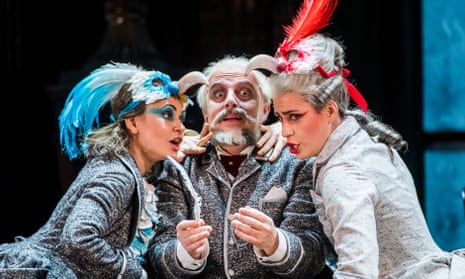Experiencing the Royal Opera’s new Queen of Spades is like trying to watch a fireworks display stuck behind a tall person filming it on their mobile. The noise is tremendous; so are the sights, but you can see them only through someone else’s lens. The man with the phone in this scenario is director Stefan Herheim, and his lavish production, which baffled and excited audiences in Amsterdam in 2016, is an intelligent, compassionate, stimulating frustration.
Herheim, director of last season’s Vêpres Siciliennes, here is not half as interested in the story of Pushkin’s novella and Tchaikovsky’s opera as he is in the story of Tchaikovsky himself. In fact, forget Pushkin; this is all about Tchaikovsky. The composer was the toast of musical Russia; he was also a depressive, a gay man who had a breakdown following a disastrous marriage, someone who could plausibly have drunk the cholera-infected water that killed him in full awareness that it was contaminated. Knowledge of all this is crucial to understanding the next three hours on stage, and Herheim concedes us a few projected lines of explanation at the very start.
The next thing we see is Tchaikovsky himself – and from then on the composer is rarely out of sight, directing the action or taking it down as dictation with his quill. Sometimes he is surrounded by two-dozen chorus doppelgangers, brandishing glasses half full of iridescent cholera water. He is played by the baritone Vladimir Stoyanov, because this is not a silent role: Herheim has projected Tchaikovsky into the character of Yeletsky, the dull old prince who offers heroine Liza love and security only for her to gamble her honour and sanity on flaky antihero Gherman instead.

Yeletsky is normally a bit part, singing little except one of Tchaikovsky’s most ravishing arias – how beautifully Tchaikovsky wrote for the boring men in his operas, and how he must have craved ordinariness for himself! Here he is the star, although Herheim often has him looking silly or awkward, miming away at the piano like some 19th-century version of Animal from The Muppets, or disrupting any intimate scene between other characters.
The Royal Opera has not recently been a stranger to stagings about operas rather than of them: Barrie Kosky’s Carmen was a breath of fresh air. But Carmen is a hackneyed opera, and The Queen of Spades is not, and Herheim’s approach is so all-absorbing that Tchaikovsky’s characters are turned into ciphers. It’s brilliant, but there’s a big hole at its centre.
Stoyanov carries off his vastly expanded role, but the two conventional leads are less convincing, Eva-Maria Westbroek’s soprano misses the ideal innocence for Liza, and Aleksandrs Antonenko sings Gherman with a scything tenor that’s a blunt instrument, too often veering off pitch. The supporting cast, though, is excellent, including John Lundgren’s velvet-voiced Tomsky, and Felicity Palmer, mesmerising as the Old Countess. If this is indeed this remarkable singer’s last stage role, it’s a fittingly memorable one.
And this is a truly memorable staging: Philipp Fürhofer’s floor-to-ceiling sets are glorious, conjuring illuminated streets and bustling crowds as if by magic, thanks to huge black mirrors and Bernd Purkrabek’s sleight-of-hand lighting. The chorus and orchestra, lush and lyrical in response to Antonio Pappano’s propulsive conducting, will leave you yearning to hear them in more Tchaikovsky. It might also leave you with the desire to see a real, actual staging of The Queen of Spades.
Until 1 February. Box office: 020-7304 4000.

Comments (…)
Sign in or create your Guardian account to join the discussion